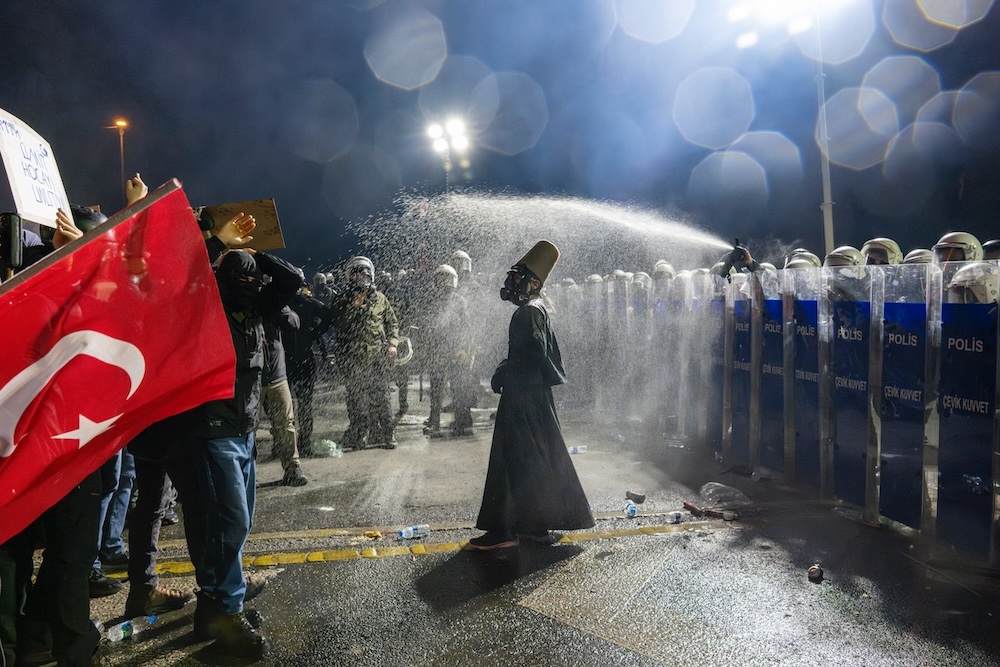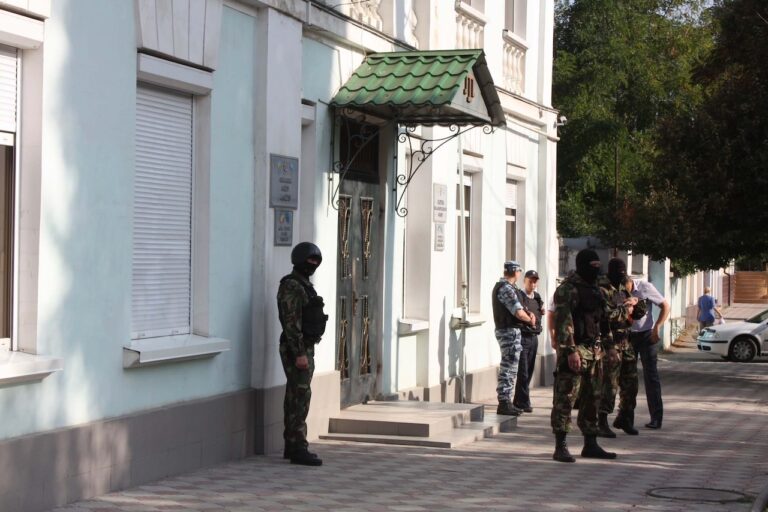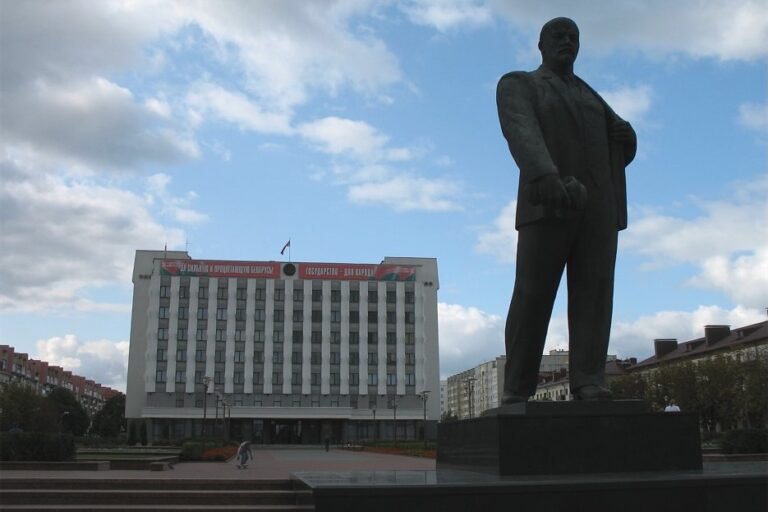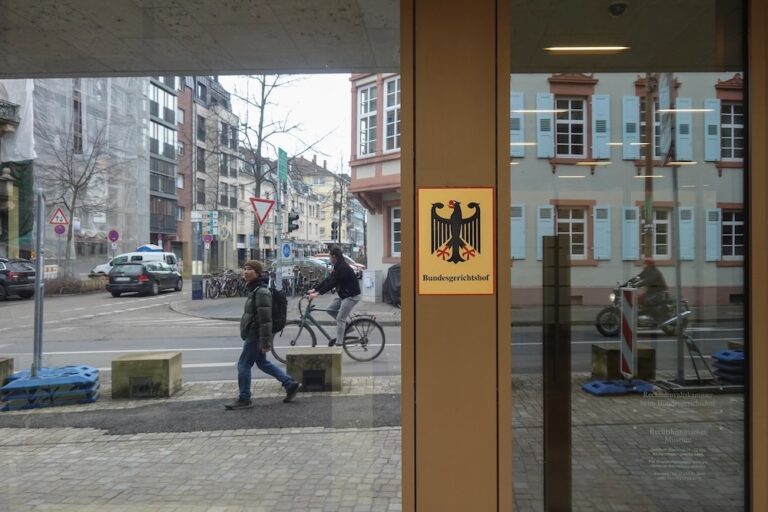Europe and Central Asia: A free expression and civic space round-up produced by IFEX's Regional Editor Cathal Sheerin, based on IFEX member reports and news from the region.
Crackdown on journalists and protesters in Turkey; Republika Srpska adopts “foreign agents” law; Serbian authorities target CSOs and press; protest against wiretapping of journalists in Romania; Albania bans TikTok; CSOs under investigation in Germany; Hungary passes law banning Pride; new platform launched to document online attacks on women journalists in Ukraine.
Turkey: Arrests, protests, censorship
The detention – then arrest – of Istanbul Mayor and opposition figure Ekrem İmamoğlu saw mass protests across Turkey in late March.
Police responded with water cannons and tear gas , and detained over 1,000 protesters. Several reporters covering the demonstrations say they were deliberately attacked by police using batons and rubber bullets. At least nine journalists were detained during house raids.
For 42 hours following İmamoğlu’s detention – which Human Rights Watch (HRW) condemned as “politically-motivated” – the authorities also restricted access to information by throttling social media across the country. Social media platform ‘X’ contributed to the crackdown by suspending the ‘X’ accounts of several opposition leaders.
İmamoğlu, who was about to be declared the Republican People’s Party (CHP) candidate for the 2028 presidential election, was detained on 19 March on dubious terrorism and corruption accusations. Another 105 people, including local government officials, were detained on the same charges. İmamoğlu was later formally arrested and suspended from office.
Condemning the crackdown, PEN International called on Turkey to “urgently uphold the rights to freedom of expression, information and peaceful protest”.
Bianet – whose ‘X’ account was recently blocked by court order – is keeping us all updated on the current crackdown, and has published a very useful explainer that looks at what İmamoğlu’s detention and arrest could mean for politics and the Kurdish peace talks.
In mid-March, lawmakers passed a highly controversial cybersecurity law that criminalises “false” claims about data leaks. Now, unless the government officially admits that there has been a data leak, those reporting it – including journalists – will face prison sentences. Tellingly, a massive and embarrassing data breach in 2024 raised questions about the Turkish government’s ability to protect Turkish citizens’ private information.
Over 100 women and LGBTQI+ activists were detained in Istanbul following the Feminist Night March on International Women’s Day (IWD). The police cited the chanting of “banned slogans” as the reason for the detentions.
The Balkans: CSOs defend civic space
IFEX members and other media freedom groups have called on Republika Srpska – Bosnia and Herzegovina’s Serb-led entity – to rescind the recently adopted “foreign agents” law. The new legislation establishes a “special registry” of civil society groups (CSOs) that receive funding from abroad and bans them from taking part in very broadly-defined “political activity”. The law’s opponents argue that it will be used to target the government’s critics and undermine state institutions and the media.
Meanwhile, the Prosecutor’s Office of Bosnia and Herzegovina has issued an arrest warrant for Republika Srpska’s president, Milorad Dodik: he was recently convicted of violating the country’s constitutional order, and was sentenced to one year in prison and banned from holding political office. He has vowed to stay on as president.
Serbia saw massive anti-corruption/anti-government protests in March. The protests were triggered by the collapse last year of part of a railway station, which resulted in 15 deaths. The protesters blamed the government for cost-cutting and incompetence. Serbia’s autocratic president, Aleksandar Vučić, claimed that the protests represented an attempt to oust him by force, and that western intelligence agencies were behind them. The European Federation of Journalists (EFJ) and other IFEX members called on the Serbian authorities to end the persecution of journalists who covered the protests.
The Serbian authorities have also been ramping up the pressure on civil society. ARTICLE 19 condemned recent police raids on human rights groups – including those working on access to information and accountability. These raids followed dubious allegations of misuse of funds.
Ahead of a presidential election re-run in May, Romania’s Constitutional Court banned pro-Russian, far-right populist Călin Georgescu from running again: he was accused of “violating the very obligation to defend democracy”. Georgescu took a shock lead in the first round of the presidential election last November. That result was annulled after Romanian intelligence alleged that “a foreign power” had interfered on behalf of Georgescu, who has received public support from Elon Musk. The Global Voices website has published an interesting article that looks at the current threats to democracy and civic space in Romania: it identifies disinformation, low media literacy, external political interference, technological manipulation and corruption as the main challenges.
In early March, Musk attacked IFEX member ActiveWatch and other Romanian CSOs. Claiming that “NGOs are trying to destroy democracy”, he shared an ‘X’ post by a far-right account that accused the CSOs of working with the EU and George Soros to create a “censorship bill” ahead of May’s election. This came after ActiveWatch had taken part in a roundtable discussion on election integrity with local and regional actors. ActiveWatch pushed back on Musk’s ludicrous claims by issuing a statement patiently explaining its work on freedom of expression.
ActiveWatch also joined the International Press institute (IPI) and several Romanian press freedom groups this month in protesting the recently-revealed wire-tapping of journalists by the Romanian security services. In a letter to the government, the groups described the wire-tapping as “the latest in a long list of abuses against journalists, which are likely to affect the proper functioning of society, by intimidating journalists who try to bring facts and data of public interest to the public”.
This month, Albania banned access to TikTok for 12 months, citing concerns over children’s exposure to harmful content and the security of users’ personal data. IFEX members, Albanian CSOs and regional media freedom groups said that the ban will have a disproportionately negative impact on freedom of expression and called for it to be revoked. They also called on the government to address its concerns by initiating a consultation process involving a broad range of stakeholders, including digital rights advocates.
For a deep dive into the situation for media freedom in the Western Balkans and Turkey, check out a recently published report produced by nine regional CSOs, including four IFEX members: the Albanian Media Institute, Bianet, Mediacentar Sarajevo and the South East European Network for Professionalisation of Media (SEENPM). Against a backdrop of polarising rhetoric, political instability, corruption, and authoritarianism, the report identifies a rise in attacks on journalists and a decline of trust in journalism across the region. Individual country reports and datasets can be viewed here.
Germany: Intimidating civil society
International Women’s Day (IWD) in Berlin, Germany, saw police maintain their record of intolerance for pro-Palestinian activism by violently attacking women marchers who showed solidarity with the Palestinian people. According to reports, 28 marchers were arrested.
The threat to civic space in Germany seems to increase month-by-month. After winning the recent federal elections, the Christian Democratic Union (CDU) party submitted a formal parliamentary inquiry to examine the “political neutrality” of certain state-funded CSOs. Those targeted include some of the most prominent organisations working in democracy, advocacy, environmental justice, and non-profit journalism. Rights groups have accused the CDU of using this probe to intimidate its critics after CSOs organised rallies to protest the breaching of the so-called “firewall” between the far-right and the more conventional political parties: the protesters accused the CDU of collaborating with the far-right Alternative for Deutschland (AfD) party in order to vote though stricter immigration policies.
Belarus
In February, the Belarusian Association of Journalists (BAJ) published its review of the final quarter of 2024, which saw an increase in pressure on civil society ahead of Belarus’s presidential election in January 2025. For the period in question, BAJ recorded an increase in detentions and criminal prosecutions of journalists at home and in absentia. A total of 20 journalists were detained; 17 saw their homes raided by the authorities.
Access to information was also hit hard, with the authorities using anti-extremism legislation to limit access to independent information sources. According to BAJ, by September 2024, Belarus had blocked approximately 14,000 web resources, labelling more than 5,000 of them as “extremist information”.
In March it was revealed that the Belarusian and Russian authorities had placed BAJ deputy chairman Aleh Aheyeu on an inter-state wanted list.
March also saw Imprisoned journalist Volha Radzivonava added to Belarus’s list of “extremists”.
In brief
In Hungary, the legislative war on LGBTQI+ expression continues. In March, lawmakers passed a law that bans Pride marches and similar public events that support LGBTQI+ rights. The legislation authorises the use of controversial facial recognition technology to identify event organisers and attendees; those convicted of breaking the law will face fines. HRW called on the EU Commission to press the Hungarian government to repeal the law.
In Ukraine, the CSO Women in Media launched a platform to document cases of online violence against Ukrainian women journalists targeted for their work. An interactive map of these incidents is available to view here.
The Hungarian Civil Liberties Union (HCLU) and others submitted an intervention to the European Court of Human Rights (ECtHR) in the spyware case of Brejza v Poland. For years, Polish opposition politician Krzysztof Brejza’s phone was monitored using Pegasus spyware and the private information collected was used against him during an election campaign. The interveners presented the “serious human rights consequences of spyware abuse” and urged the court to ensure that those affected have access to effective legal remedies.
The Council of Europe’s Platform for Journalists’ Safety (which includes several IFEX members as partners) published its annual report in March. According to the report, last year saw 266 attacks on press freedom logged by Platform partners. The greatest number of incidents recorded occurred in Ukraine (40 incidents), Russia (32), Turkey (28), Serbia (20) and Georgia (18). For full details, check out the report. You can also watch a discussion about the report’s findings here.



